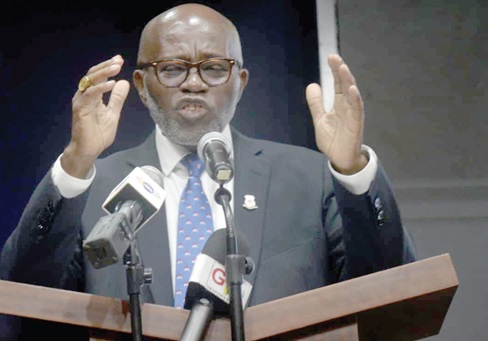
Take major decisions to reform or fold up - Prof. Essuman charges private varsities
A professor of Education and Development, Prof. Ato Essuman, has warned of many private universities collapsing in the next five-10 years if they do not take major decisions to reform to meet contemporary demands.
“This .is a documentary review of the struggles of private universities in Ghana, which in many ways have reached crises point to the extent that if major policy actions and decisions are not taken to reform, reengineer and redirect their current operations that may enable them respond to the contemporary demands of the market, many will fold up in the next five-10 years.
“The truth is that the longer things stay as they are, the worse will be the positions of many,” he said.
Prof. Essuman, who is also the Founding Dean of the Faculty of Education and Entrepreneurship of the Methodist University Ghana, said this when he presented a paper at the Methodist University Ghana Public Lecture in Accra last Thursday.
It was on the theme: “Ghana’s Private Universities In Crisis: Were They Founded As a Necessary Risk Or a Public Relation Gimmick? Time To Rethink”
The event attracted a host of dignitaries including the Chairman of the Council of State, Nana Otuo Siriboe II.
Challenges
Prof. Essuman, Dean of the School of Research and Graduate Studies and Professional Development of the Methodist University Ghana, said one difference between public and private universities in the country was while the public universities received state funding and employ seasoned full-time lecturers, and conduct significant amount of research, private universities were underfunded and exclusively dependent on student fees.
Prof. Essuman said another challenge was high cost of affiliation fees charged by mentoring institutions.
Mentoring institutions, he said were fleecing their mentees and that fees of all kinds were charged - affiliation fees, accreditation of programmes, number of students, graduation fees, certificates, transcripts, hiring of gowns and many more.
“Some of these fees are very exorbitant, but you'll have to pay if you don't want to be sanctioned.
“At the end of the day students are waiting for graduation.
The watchman - Ghana Tertiary Education Commission is fully aware of this but watches on for such fleecing to be meted out on private universities,” he said.
Regulator
Concomitant to the high rates of fees charged by mentoring institutions, he said was the high fees charged by the regulator itself.
“When we were young, and there were efficient public buses, children paid half of the fare price.
Mentees pay the same rate for institutional accreditation and programme accreditation like their mentoring institutions.
This, to me, is a punishment and in every three years, an institution will have to go back for re-accreditation.
Why re-accreditation of programmes was changed from five to three years has not been explained,” he said.
Another problem, he said was the negative public perception by employers and the public.
Prof. Essuman, who is also the Chairman of the West African Examinations Council (WAEC) said some employers in both the public and private sector believed that graduates from private universities were substandard, inferior in quality compared with those from public universities.
Moreover, he said competition from public universities was also a challenge.
In addition, he said a challenge was programme offerings and weak linkage with industry.
The Vice Chancellor of the Methodist University Ghana, Prof. Philip Ebow Bondzi-Simpson, who chaired the function, said the event was not a talkshop and that “we would engage the policy makers to formulate appropriate policies for the improvement of our country”.
